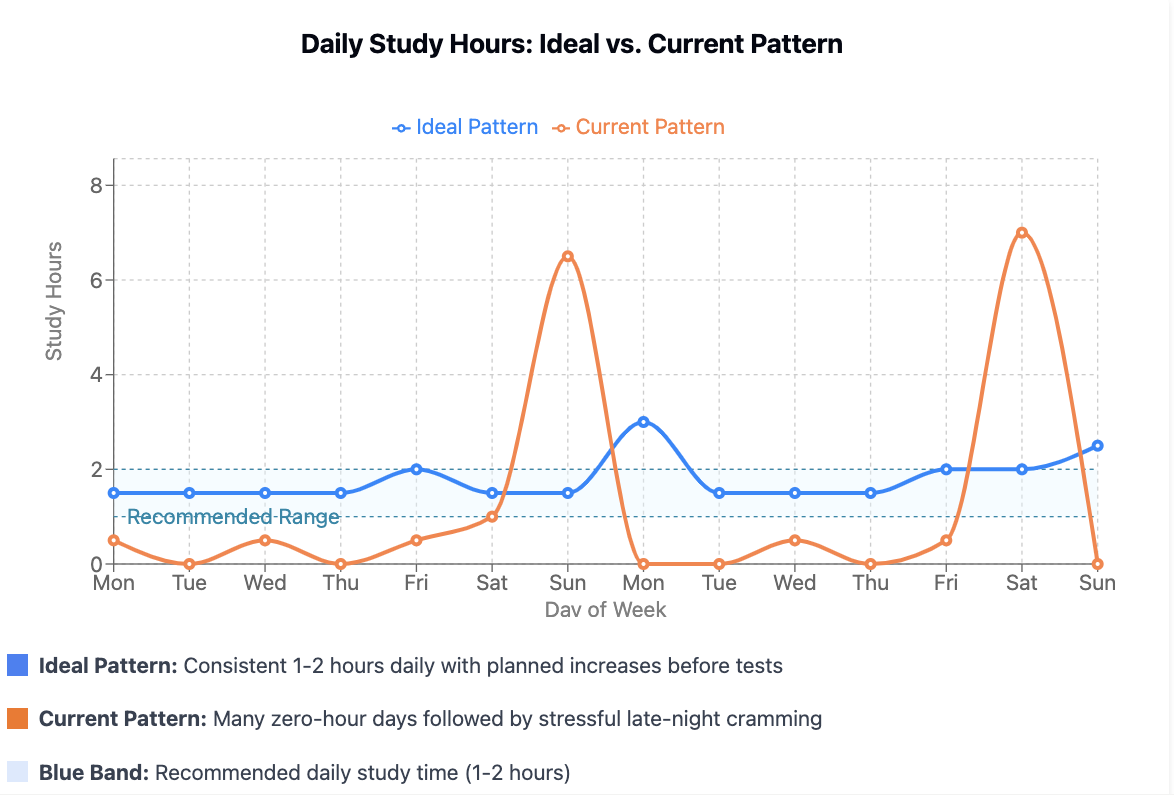The Sleep-Stressed Teen: How to Fix the Foundation
Meet Malachi. He’s a high school junior, an athlete, and an AP student.
His days are packed: early morning workouts (he hates leg day), a full class schedule (including a study hall, which he scrolls his phone during), basketball practice (he starts Varsity), and hours of homework. He’s bright but struggles with executive function, so he’s constantly behind on assignments.
Malachi's mom called us. She was happy he was doing well in so many areas. But she was distressed by his study patterns. She wanted it to look more blue than orange -
- those "orange spikes" created stress for everybody. One of them was a physics project he didn't start until the night before. Another was making up 10 calc assignments, all at once.
By the time he gets home from practice, he’s exhausted, she told us. He naps. He eats. He scrolls on his phone. Then at 9:30 p.m., he realizes: I still have homework. He stays up late, often past 1 a.m., juggling physics problems and Snap notifications, with Netflix on in the background.
Then at 5:45 a.m., his alarm blares. Time to start the cycle over again.
His mom is exhausted too. She sees him barely making it out the door in the morning. She knows he’s getting by, but just barely. She wonders:
Where do we even start?
We Suggest: Start with Sleep
With a kid like Malachi, you could attack this from a dozen angles.
Is his course load too much? I suppose we could cut down on the APs. Is he overcommitted with sports? But basketball is his passion. Is he eating well enough to sustain his energy? Sometimes seems like he eats 5000 calories, sometimes 1500. Is screen time eating into his ability to focus? Well of course, but ...
All of those matter. At RESET, we start with sleep, because nothing else works without it. Here's why:
Sleep is measurable. You don’t need to debate it. Either he got 8 hours or he didn’t. Teenagers (and their parents) like this.
It affects everything else. A well-rested brain makes better decisions. You're not as impulsive. You're better able to manage time. Your mood is improved.
It’s the easiest habit to track daily. Unlike grades or productivity, which take weeks to see improvement, sleep changes show up in a day or two.
Step 1: Reverse-Engineering a Sleep Plan
The first thing we ask: What time do you need to wake up?
For Malachi, it’s 6 a.m. If we want 8 hours of sleep, that means lights out by 10 p.m.
Which leads to the next question: What needs to happen before 10 p.m. for that to be possible?
Here’s what we built with him:
9:45 p.m. – Reading to Unwind
Malachi used to love reading, but it fell by the wayside. We helped him pick a book that actually interested him (he likes The Belgariad). To cue the habit, we put the book on his pillow every night.
9:15 p.m. – Phone Handoff
This was the hardest part. We set up a system where his older sister texts, “Bring me your phone” at 9:15 p.m. No arguing, no negotiating, it’s just the system. We chose the older sister to have another partner besides mom and dad.
8:45 p.m. – Homework Cutoff
To be in bed by 10, homework has to end by 8:45. That meant no waiting until after basketball to start. Or trying to power through while half-watching YouTube.
Malachi was able to use study periods at school to get ahead (instead of letting them disappear into scrolling). He was better-rested, remember ... so the temptation to just let the period float away wasn't as strong.
Before That: Fixing the Daytime
Malachi’s nights were chaotic because his days weren’t structured for success. Again we focused on reclaiming study periods. We made sure he was eating consistently so he wasn’t crashing after practice. We helped him break big assignments into smaller steps so they weren’t all last-minute, harried fire-drills.
Step 2: Daily Check-Ins
For three weeks, we checked in every weeknight:
Did you get at least 7.5 hours?
Did you hand off your phone at 9:15?
Did you get at least 30 minutes of work done during the school day?
I'd love to tell you the answer was always yes here. It wasn't! But we saw steady, if occasionally choppy, progress. Meeting daily at first helped us relax a bit, and to lower the stakes. If today didn't work, tomorrow will. Tracking these things wasn’t about perfection; it was about creating evidence of progress.
The Results
By week three, we did see some wins.
Malachi was averaging 7.2 hours of sleep, up from 5.8. He was no longer crashing after practice. His schoolwork felt more manageable because it wasn’t all happening at 11 p.m.
His mom wasn’t fighting him about wake-ups and late homework because he wasn’t constantly running on empty.
It wasn't perfect. Malachi himself told me - "this is a lot harder than it looks." And he hated giving away his phone, in particular.
But he hung in there, and we built the muscle of sleep.
The Takeaway for Parents
If your teen is drowning in obligations, you might be wondering: Where do I even start?
We gently suggest: Fix sleep first.
Not because it’s the only thing that matters. But because everything else is harder without it.
Once sleep is steady, you can tackle the next problem. Maybe it's homework routines, screen time, sports commitments. But until then, work on sleep!
